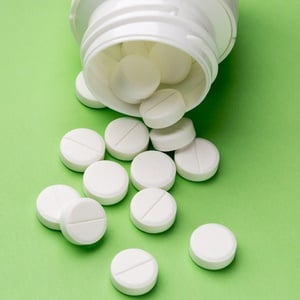
Doctors routinely recommend it for patients who've had a heart attack or stroke, and studies show its blood-thinning affects can help prevent a repeat of such potentially deadly cardiovascular events.
The drug may also help people with a family history of heart disease or individuals at high risk of heart attack or stroke, such as smokers or those with high blood pressure or high cholesterol, doctors say.
Many still not getting the message
The US Preventive Services Task Force agrees. There's good evidence that aspirin decreases the incidence of coronary heart disease in high-risk adults, it concluded in a statement issued in January 2002.
It's estimated that more than 26 million Americans are taking aspirin for their hearts. Yet many good candidates for aspirin therapy - people with a 10 percent or greater risk of having a heart attack in 10 years - aren't getting the message.
"Those are the same patients that are probably not getting their other risk factors taken care of," said Dr Arlene Brown, a family physician and a member of the American Academy of Family Physicians' board of directors.
"They're obviously not seeking medical care," she added.
Controversy about amount needed
Doctors disagree about the exact amount of aspirin that heart patients should be taking. Many start their patients out at 81 milligrams, the equivalent of one baby aspirin or "low-dose" adult aspirin. Others recommend taking half of a standard 325-milligram aspirin daily or one aspirin every other day.
Lower doses minimise the potential risk of unwanted side effects, which can include stomach bleeding, bleeding in the brain, kidney failure and other kinds of strokes.
Many patients on daily low-dose aspirin therapy have followed their doctors' advice that they use special "coated" tablets to avoid stomach problems such as ulcers.
But a study presented in May at the American Heart Association's annual conference on Arteriosclerosis, Thrombosis and Vascular Biology raised concern that the coated form may be tougher for the body to absorb.
What the researchers found
The study found normal-weight adults had a 20 percent chance of receiving inadequate protection from coated aspirin. Overweight patients were at even greater risk of missing out on the cardiovascular benefits.
Because aspirin therapy is so individualised and potentially risky, people should never start swallowing tablets without consulting their doctor first, physicians say.
To many people, that advice may sound silly since it's not some newfangled chemical compound. But if you're an otherwise healthy adult, an aspirin a day could cause more harm than good, the US Food and Drug Administration (FDA) warns.
Labelling issues
That is one reason why an expert panel of the FDA last December rejected a proposal by Bayer Corp. to expand aspirin labelling to include recommendations for preventing a first heart attack in people at moderate risk. Voting 11-3, the panel concluded that existing studies were not sufficient to support such a label change.
"If you give aspirin to the wrong people, you don't necessarily reduce risk, you increase it," said Dr Steven Nissen, a Cleveland Clinic cardiologist and one of the dissenters who served on the advisory panel.
Considering the proliferation of drug advertising to US consumers, Nissen feared otherwise healthy adults - the so-called "worried well" - would be tempted to take aspirin as a preventive measure, only to suffer negative health consequences, such as stomach problems.
"I literally saw the potential to harm the public health rather than do good if we gave too broad a claim," he explained.
Where to draw the line?
Even so, he remains a staunch believer in aspirin therapy when it's called for. "Of course, anyone who's had a heart attack, they should all be on an aspirin a day," Nissen said.
The controversy, he continued, is over where to draw the line. "At what level of risk do you start to get to the point where aspirin in helpful and not harmful?" – (HealthDayNews)




 Publications
Publications
 Partners
Partners











